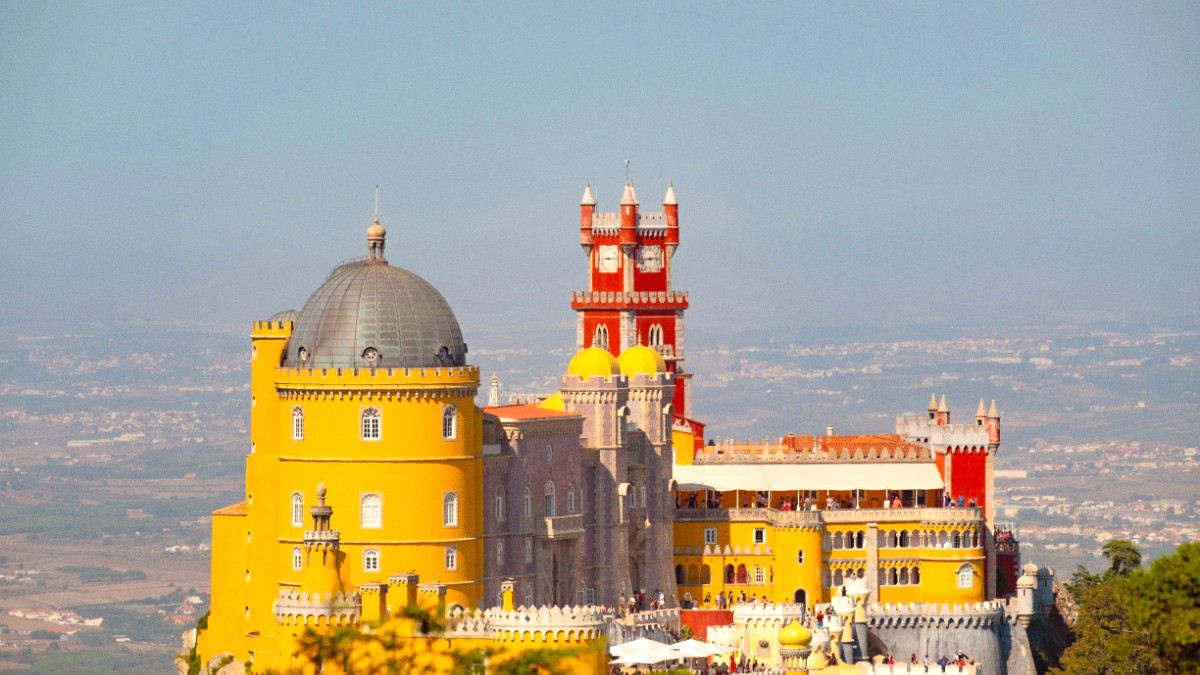
Lisbon, Portugal
Summer (June - August): Temperatures range from 18°C to 28°C (64°F to 82°F). Expect warm, sunny days. Humidity can be high. Rainfall is minimal. Sintra often offers a slightly cooler escape due to its elevation and proximity to the ocean.
Autumn (September - November): Temperatures cool, ranging from 14°C to 23°C (57°F to 73°F). September often extends summer-like conditions. Rainfall rises, especially in October and November. Winter (December - February): Temperatures are between 8°C and 15°C (46°F to 59°F). This is Sintra’s wettest season, with frequent rain and cooler winds. Spring (March - May): Temperatures rise steadily from 11°C to 22°C (52°F to 72°F). Rainfall lessens as the season progresses. The landscape turns lush, and flowers bloom.
Warm, sunny weather with long daylight hours, ideal for outdoor activities and extended sightseeing. All attractions operate at full capacity.
Significant crowds, specifically at popular palaces like Pena Palace and Quinta da Regaleira. Higher prices for accommodation and flights. Expect long queues for attractions.
Very High
Reliably dry season, ideal for outdoor exploration.
Lengthy queues and peak pricing for services.
Moderate Crowds
Pleasant temperatures, blooming gardens, and better value.
October can see increased rainfall and morning fog.
Lowest Crowds
Significantly lower prices and a quiet, local feel.
Cooler temperatures, higher chance of rain, shorter daylight.
Shoulder season (April-May, September-October) provides pleasant weather and fewer crowds, making it ideal for leisurely exploration and capturing stunning images without too many people in the frame. Early mornings in high season help avoid peak crowds.
Spring (March-May) offers lush landscapes and comfortable temperatures, suitable for exploring the extensive parks and trails. Early autumn (September) is also good before heavy rains begin. Avoid the hottest summer months for strenuous activity. Monserrate Palace and Quinta da Regaleira's gardens are specifically beautiful during this time.
Embrace the mystical ambiance; views might be obscured, adding to the charm.
High points like Pena Palace can be breezy; a Light windbreaker is a wise addition.
Versatile clothing options for temperature changes throughout the day.
A waterproof outer layer proves sensible in cooler, wetter months.
Even on cloudy days, UV rays can be strong; sun cream is still useful.
Portugal is part of the Schengen Area, a group of 27 European countries that have abolished passport and other border control types at their common borders.
Regardless of your nationality, prepare specific documents for entry.
Sintra, while offering experiences from budget-friendly to luxury, generally presents costs similar to or slightly higher than Lisbon for attractions due to their concentration.
The official currency of Portugal is the Euro (€, EUR). ATMs, known as Multibanco, are widely available and offer generally favorable exchange rates. Major credit and debit cards (Visa, MasterCard, American Express) are widely accepted in hotels, most restaurants, and larger shops.
Always inform your bank of your travel plans to prevent card holds due to unusual activity. Carry a small amount of cash for smaller purchases, markets, or establishments that may not accept cards. Avoid exchanging large sums of money at airport exchange counters, as they often offer less favorable rates; use ATMs for cash withdrawals instead.
Approximate daily cost: €50-€80. This budget covers hostel dorms or guesthouses, supermarket meals, street food, and public transport for attractions.
Affordable lodging and dining options available.
Limited to specific attractions or free areas.
Approximate daily cost: €100-€200. This budget covers mid-range hotels, casual restaurants, public transport, and visits to 2-3 main attractions.
Comfortable stay with various dining experiences.
May not include all premium experiences or fine dining.
Approximate daily cost: €300+. This budget allows for luxury hotels, fine dining, private transfers, guided tours, and exclusive experiences.
Access to all major attractions and high-end services.
Highest daily expenses, budget flexibility is .
| Category | Range (Low) | Range (High) |
|---|---|---|
| Accommodation (per night) | €20 (hostel dorm) | €400+ (luxury hotel) |
| Meals (per person) | €3 (snack) | €60+ (fine dining) |
| Local Transport (daily) | €4.55 (bus 434) | €15 (short taxi/rideshare) |
Your well-being in Sintra is paramount.
No mandatory vaccinations for entry into Portugal for general tourism.
Ensure routine vaccinations (MMR, DTP, Polio, Flu) are current. Consult a healthcare provider for personalized advice.
Traveler's Diarrhea: Generally low risk; practice good hand hygiene. Sunburn/Heatstroke: Use High-SPF sunscreen, wear hats, and stay hydrated with a Reusable water bottle.
Portugal maintains a modern healthcare system.
EU Citizens: Use your European Health Insurance Card (EHIC) for state healthcare services on the same basis as a Portuguese citizen. Non-EU Citizens: Comprehensive Travel insurance that covers medical emergencies, hospital stays, and emergency medical evacuation is strongly advised.
Pharmacies (Farmácias): Easily identified by a green cross, they offer a wide range of over-the-counter medications and basic health advice. Hospitals (Hospitais): Available for serious conditions. The Hospital Dr. José de Almeida is the general hospital in Sintra. Lisbon has larger, more equipped hospitals.
Tap water in Sintra is generally safe to drink.
Pickpocketing occurs in crowded areas and on public transport. Secure valuables with a Money belt or Cross-body bag.
Be aware of common tourist scams; avoid overly friendly strangers offering unsolicited help. Sites like AirHelp handle specific issues like flight compensation.
Wildfires can be a risk in summer; adhere to warnings. Coastal areas may have strong currents.
Keep contact information for your country's embassy or consulate in Lisbon readily available.
A well-stocked personal health kit prepares you for minor ailments, allowing quick recovery.
Plasters/Band-aids, antiseptic wipes, pain relievers (Ibuprofen), Anti-diarrhea medication.
Blister plasters or Moleskin for extensive walking on uneven surfaces. Carry a small First aid kit.
Water filtration products if exploring remote areas. Insect repellent, Sun protection (sunscreen, sunglasses, hat).